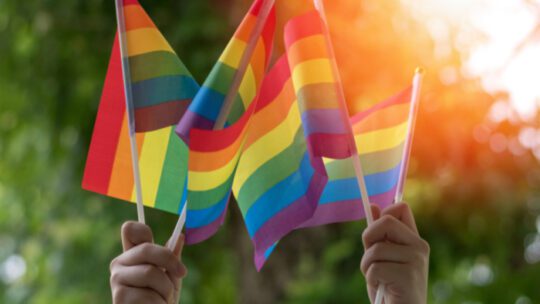
The Climate
Owing to recent political and societal events, communicators have a new perspective as we enter Pride Month 2022. It seems clear the LGBTQIA+ community and its allies face a heavy burden and an uncertain future.
Florida House Bill 1557, or the 'Don’t Say Gay' bill, threatens harm on queer youth. It bans conversation of gender and sexuality in public classrooms. In addition, it likely will increase the anxiety around sexuality and gender in schools, which already is high for LGBTQ+ kids.
In 2015, the National Youth Risk Behavior Survey found gay students are at a far greater risk of depression, suicide and substance use. Classrooms are an essential space for growth. “For youth to thrive in schools and communities, they need to feel socially, emotionally, and physically safe and supported,"according to the CDC.
Though LGBTQ+-inclusive and gender-affirming children’s books are gaining popularity, Bill 1557 likely will ban having them in schools. In fact, queer children’s books already are among some of the most-banned books in the country. The 2020 Most Challenged Books List (600 titles) notes eight of every 10 of its books share LGBTQ+ themes.
Since 1557 explicitly endangers storytelling and representation, we–communicators–must act.
For PR pros this means crafting public awareness and educational campaigns that advocate for LGBTQ+ rights. 52 years since the first gay rights march, Pride Month 2022 is an ideal moment to begin as threats increase.
For instance, the recent Supreme Court leak of Roe is concerning in many ways, yet has increased implications for LGBTQ+ people, especially those living in states with strict trigger laws. In 2022, one in ten LGBTQ+ people reported that a healthcare provider refused them treatment. Furthermore, legal principles undergirding the super-precedent may jeopardize queer peoples' marriage rights.
For a community that faces disproportionate financial hurdles–whether through workplace discrimination or otherwise–the option of medical tourism is not always available. Many times, discriminated groups rely on crowdsourcing and other workarounds to meet basic needs.
Again, PR pros and allies can help. They can advance medical equity for gay and trans women through corporate social advocacy and social media expertise. History is filled with communicators who've fought for such rights.
The Weathering
In 1970, transgender activists Marsha P. Johnson (1945–1992) and Sylvia Rivera (1951–2002) added new purpose to a budding movement following the 1969 Stonewall riots. The two recognized their community was unrepresented in the first wave of the gay rights fight. As such, they focused on transgender equal rights, founding the Street Transvestite Activist Revolutionaries (STAR).
A PR pioneer, Audre Lorde was another queer woman of color whose contributions to activism as an author and poet inspire today’s communicators. Lorde brought attention to the idea of intersectionality in American social movements. Moreover, she spoke about the importance of positionality during her 1979 presentation at the National March on Washington for Lesbian and Gay Rights.
Following these innovators, communicators can take several steps to address the current battles facing the LGBTQ+ community.
First, they can advance the concept that it is imperative for gay people to have a seat at the table. LGBTQ+ professionals in the C-suite are only-ies in their organizations and among the few across many industries. Specifically, just four Fortune 500 companies have an "out" LGBTQ+ CEO.
Second, these tables should conduct the research, outreach and reciprocal communication necessary to find how they can effectively help gay rights advocates in their communities. As BCW's Sabrina Browne wrote, “the most impactful campaigns are rooted in long-term allyship.” While each marginalized community faces a unique struggle, communicators dedicated to genuine DE&I efforts are working toward holistic solutions.
Behind the stories we tell as communicators, there are real people with valuable personal insights. This is a field where we are tasked, in different ways, to celebrate humanity and enact change. Let’s try to enact that change from inside-out.
Editor's Note: Since the Museum of Public Relations’ first Pride event, in 2019, there has been a strong focus on continuing assembling a diverse array of PR pros, activists and political leaders to share insight. Tonight (June 2, 2022), the Museum is hosting its 4th annual celebration of the LGBTQ+ community in PR. Looking toward the future of DE&I for queer PR pros, the event will explore urgent issues, offering insight and tactical advice for those ready to raise their voice. Watch the full replay.
Kayla Casillas is a media manager at The Museum of Public Relations.
[Editor's Note: The writer’s views do not necessarily reflect those of PRNEWS. We invite opposing essays from readers.]
“What we must do is commit ourselves to some future that can include each other and to work toward that future with the particular strengths of our individual identities. And in order for us to do this, we must allow each other our differences at the same time as we recognize our sameness.”
—Audre Lorde (1934-1992), American poet, author, activist and PR pioneer.
